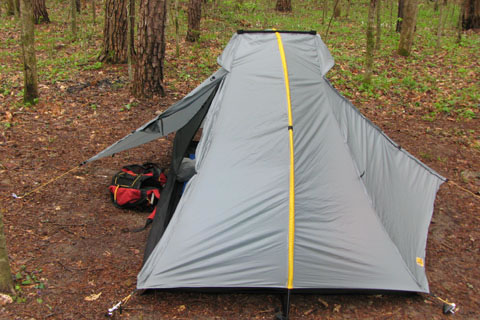| 488 | Trail Sense - Tents | 2011-10-03 |

The tent is home to the camper. Whether the camper is a staying one night in a campground, backpacking the AT, or climbing some remote mountain, the tent is a safe haven.
On a trip to Linville Gorge, NC, a group of college students arrived late in the day and hastily set up their tents near mine. They were planning on staying in the area for a week. We discussed the possibilities of climbing a few routes together as we also looked at the threatening skies.
Later in the night the rains came. I woke to the sounds of the storm. My little tent shook in the violent winds. The rain was falling with such force I thought it was going to rip the tent apart. Soon water was puddling and it sounded like a river was running down the slope to the side of the tent. I lay awake wondering if my tent would survive...
The storm lasted throughout the night and when morning finally came the skies acted as if nothing had happened. Inspecting my little tent, I found it had weathered the storm. The others in the area were not as lucky. Leaving my campsite I passed the site of the students, their camp was in shambles. None of the tents were still standing. Some of the tents seemed to just have collapsed from the weight of the storm, while other tents seemed broken. I could see them lying in piles of the nylon tents and aluminum poles.
After a day of adventure, I returned to my campsite and the group was no longer there. I did not get a chance to talk to the campers; but I am assuming they went home. They had had enough. Of course, it did not rain another time that week. Losing their tents meant losing their trip. Of course I am sure they had some good stories to tell.
A lightweight backpacking tent is a marvelous structure. Most three season tents are strong enough (if properly pitched) to weather most storms. A few things to look for in buying a tent:
Weight - Just because a tent manufacturer calls their product a lightweight tent, that does not mean it doesn't weigh much. To truly be a lightweight tent, it must weigh less than two pounds per person (a two man tent weighs four pounds, etc.) Less than two pounds per person is even better and a slightly heavier tent can be rationalized; but two pounds or under is the goal.
Venting - Most lightweight tents are made from ultralight nylon and are often a single wall construction. Air must circulate in the tent to prevent condensation. A tent should have good low to high and cross ventilation to keep the air moving.
Bug Proof - Will the netting keep the bugs away? In some areas that is important.
Footprint - What is the true size of the tent? Is it big enough for you to lay in it. As a guideline, fifteen square feet per person is tight for non-couples. Some two man tents are smaller than others.
Ease of Setup - Can the tent be pitched in the dark, in the rain, and/or with cold hands. Can the tent be secured in a storm?
Pack size - How small is the tent when it is in the stuff sack?
Quality - Is the tent well made? If the tent rips apart in a storm, it does not matter what kind of warranty the tent has. The tent needs to be well made.
A few tent tips ...
Set the tent up in the store before buying it. Crawl inside (shoes off!) and see how it fits.
If you buy the tent mail order or online, set the tent up in the house making sure you are happy with it before taking it outside (and getting it dirty).
Practice setting the tent up in the backyard or a park before going on a trip.
Simple modifications for a tent include changing tent stakes, changing guy lines, a Tyvek ground cloth, and an internal clothes line.
Seal the seems of the tent before using it. Some tents have taped seams, I seal them anyway.
Clean the tent with soap and water.
Always, thoroughly dry the tent before storing it.
A sylnet tarp is the lightest shelter weighing less than a pound per person - it can be pitched for any storm; but you sleep at the mercy of the insects. Single wall sylnet tents weigh less than one and a half pounds per person - the trade off is condensation. A double wall tent made of lightweight materials weighs two or more pounds per person - more weight but a better all around tent.
Plastic tarps are the cheapest weight to cost ratio.
There is no perfect tent; but there are lots of good ones.
Happy tenting trails
Trail Sense